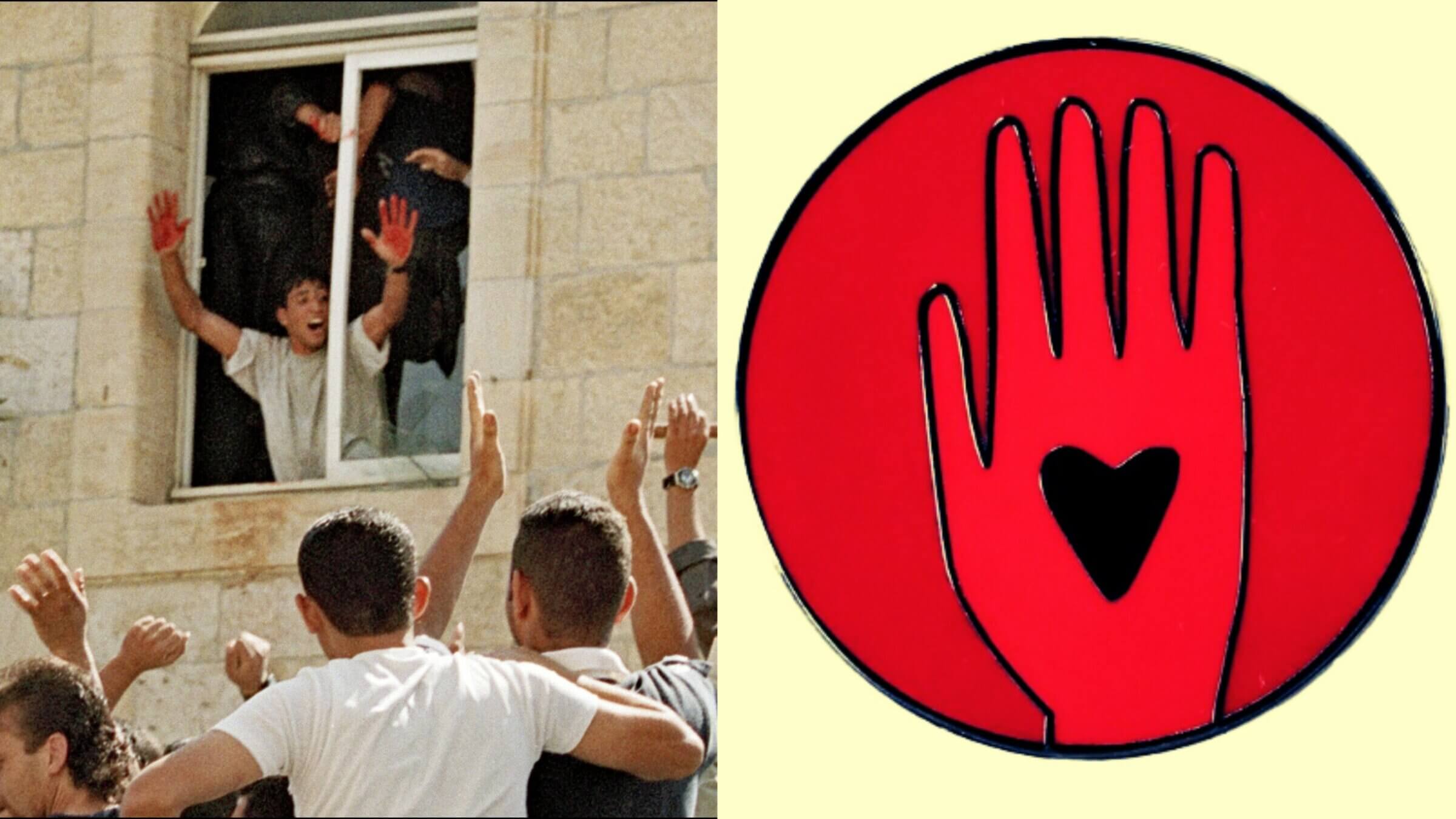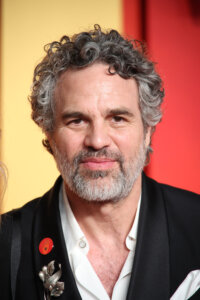Was the ceasefire pin worn at the Oscars really a reference to the Second Intifada?
The red pin, depicting a hand with a black heart in its palm, caused an uproar in parts of the Jewish world

The Artists4Ceasefire pin worn by some attendees of the 2024 Academy Awards recalled, for some, an infamous photo of the lynching of IDF soldiers in Ramallah in 2000. (Pin image courtesy of Artists4Ceasefire.org) Photo by Chris Gerald/AFP via Getty Images
If you caught Sunday’s Academy Awards — or followed the discourse surrounding them online — you likely saw the red Artists4Ceasefire pin worn by Billie Eilish, Mark Ruffalo and others at the Academy Awards. The round pin, produced by an entertainment industry group whose call for a ceasefire has been signed by the likes of Jennifer Lopez and Richard Gere, contains an image of a hand with a black heart at its center.
What could be wrong with that?
To the people wearing it — and according to Artists4Ceasefire, the group distributing it — the pin symbolizes support for an immediate, permanent ceasefire in Gaza. But to some Jewish observers the red hand recalled one of the darkest moments of the Second Intifada: the lynching of two Israel Defense Forces soldiers by Palestinians in Ramallah in 2000. And in certain Jewish online spaces, the pins caused an uproar.

Israel’s Twitter account said the similarity between the red hand on the pin and the photo that came to symbolize that event “isn’t a coincidence.” Israeli activist Noa Tishby called the pins a “subtle and overt display of Jew-hatred.” The pro-Israel outlet A Wider Frame said “the red, bloody hands on your pins has historically symbolized the murder of Jews.”
Two organizers of Artists4Ceasefire, a group of entertainment figures who signed an open letter to President Biden calling for a ceasefire, did not respond to requests for comment.
The pins are the latest gesture from the ceasefire movement to draw the ire of Israel’s supporters, who have often claimed that such calls, by not focusing on the release of hostages or the atrocities of Oct. 7, are antisemitic in nature. But to skeptics, the outrage was emblematic of attempts to delegitimize ceasefire protests by redefining their intent.
“What is a way that we could protest the horrific oppression of Palestinians that you would be ok with?” wrote one commenter on A Wider Frame‘s post.
Bloody hands
On Oct. 12, 2000, Vadim Nurzhitz, 33, and Yossi Avrahami, 38, took a wrong turn on their way to an IDF base in the Israeli settlement of Beit El. The road led to Ramallah, where thousands of Palestinians were attending a funeral for a teenager who had been killed in clashes with the IDF two weeks earlier.
Upon reaching a Palestinian Authority roadblock, the two soldiers were arrested by PA police and taken to the local police station. Word quickly spread in Ramallah that a pair of Israeli spies had been detained, and the mourners turned into a bloodthirsty mob. They stormed the station, overwhelming the police, and beat the soldiers to death.
I don’t know if this is what the Hollywood stars wanted to echo with their bloody hand pins, but this is the association it has for Israelis, and if you’re not familiar with perhaps the most iconic image of the Second Intifada, maybe don’t broadcast your ignorance. https://t.co/BqpnZUDtRO
— Eylon Levy (@EylonALevy) March 11, 2024
In footage that circulated around the world, one of the bodies was dropped out of a second-floor window onto the street, where the mob continued attacking the corpse, lighting it on fire and beating the soldier’s head to a pulp. In one less famous image, a Palestinian appeared to clutch a heart ripped out of one of the soldiers’ dead bodies.
The defining photograph of that day — of a lyncher in a police station window gleefully showing his blood-smeared hands to the mob — remains one of the most visceral images of the Israeli-Palestinian conflict.
There are other reasons that the Ramallah lynching might be at the forefront of some people’s memories since Oct. 7. Like Yahya Sinwar, the Hamas leader who planned the Oct. 7 attack, the lyncher captured in that infamous photo, Aziz Salha, was released as part of the 2011 prisoner exchange for Gilad Shalit.
Plus, some see the brutality of the lynching as a narrative precursor to Oct. 7, when Hamas terrorists murdered nearly 1,200 people in a rampage through southern Israeli villages.
‘Support for an immediate and permanent ceasefire’
But there is no clear evidence that the hand on the pin was a reference to the picture of Salha.
According to a news release Artists4Ceasefire sent to journalists prior to the Oscars ceremony, the pin “symbolizes collective support for an immediate and permanent ceasefire, the release of all of the hostages and for the urgent delivery of humanitarian aid to civilians in Gaza.”
After the ceremony, a new “About” page appeared on the group’s website that explained the pin’s design.
“The Artists4Ceasefire enamel pin is composed of a red background to symbolize the urgency of the call to save lives,” the website said. “The orange hand conveys the beautiful community of people from all backgrounds that have come together in support of centering our shared humanity. The heart being cradled in the center of the hand is an invitation for us to lead with our hearts, always, to lead with love. When we lead with love, we understand that all of our fellow beings deserve to be loved and protected.”
One of the actors wearing the pin, Ramy Youssef, an Egyptian American actor and director, put it more succinctly on the Oscars red carpet: “It’s a universal message of, ‘Let’s stop killing kids,’” he said.
Other theories of the symbol’s origin have emerged online. A few suggested it’s the Red Hand of Ulster, an Irish symbol of claims to homeland — a possible connection to Palestinian claims to Israel. One Instagram comment, liked more than 1,000 times on A Wider Frame’s post, said the hand is “the universal sign for ‘stop.’”
Even assuming that the hand depicted is a bloody one, Israelis themselves have used bloody hands as a symbol following Oct. 7 — including during protests against Prime Minister Benjamin Netanyahu.

In spite of the fact that both of the group’s public statements call for the release of hostages, many people who objected to the pin, including Tishby, claimed the organization was not doing so.
Some accounts responded to Israel’s Twitter post by saying or implying the IDF soldiers deserved their lynching.
“So funny how they try to pretend Israeli soldiers are innocent victims,” one wrote.
Still, not everyone thinks it’s reasonable for Jewish people to expect everyone else to see Salha’s bloodied hands in the image.
“‘If you’re not familiar with my personal trauma as a member of a demographic minority comprising 0.2% of the world, then you are ignorant,’ is not the persuasive line some people seem to think it is,” Roei Eisenberg, a Jewish writer, wrote Monday on Twitter.
A message from our Publisher & CEO Rachel Fishman Feddersen

I hope you appreciated this article. Before you go, I’d like to ask you to please support the Forward’s award-winning, nonprofit journalism so that we can be prepared for whatever news 2025 brings.
At a time when other newsrooms are closing or cutting back, the Forward has removed its paywall and invested additional resources to report on the ground from Israel and around the U.S. on the impact of the war, rising antisemitism and polarized discourse.
Readers like you make it all possible. Support our work by becoming a Forward Member and connect with our journalism and your community.
— Rachel Fishman Feddersen, Publisher and CEO





























